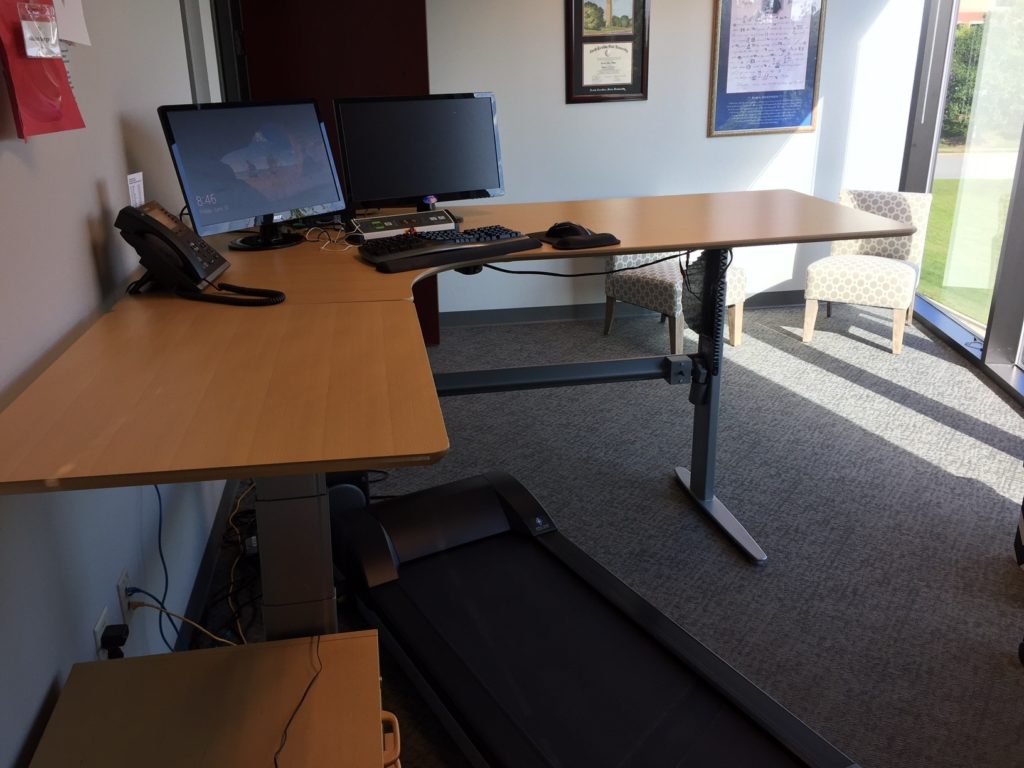
Working with clients to improve their financial futures and optimize financial fitness has become a passion for me over the years.
While I have always loved working with people and solving math problems, until a few years ago there was always something missing: movement.
The hardest part of becoming a financial planner was all the sitting. I grew up an avid soccer player, so there were always practices, games and workouts to be had in between sitting in classes. College also allowed for long walks in between courses. But in today’s modern society, working for most of us involves sitting for the majority of the day.
It’s been said that “sitting is the new smoking.” I have always had a life goal to live to 100 years old, so this news didn’t sit well with me (pun intended). Once I became a mother, time for physical activity became even more limited. Around this time, I learned about the treadmill desk. In 2013 I discussed the idea with the other FSI partners and decided to make an investment in my health and well-being.
At first it took a while to get used to walking and typing at the same time, but the learning curve wasn’t very steep and pretty soon I was doing all of my normal responsibilities while walking 4-6 miles a day. Of course I don’t walk very fast, about 2-3 miles/hour most of the time. And there are still may activities I sit down for like client meetings, phone calls, and critical reading. However, I find most of my tasks I perform better when moving vs. sitting down. These include reading and responding to emails, working on financial plans, performing quarterly reviews, and writing blog posts like this one. On days when I work from home or sit in meetings all day I find I really miss walking. Studies are even beginning to show that working at a treadmill desk could make you smarter.
Of course making the switch to a treadmill desk has not been without it’s challenges. I try to stop every hour or so to stretch my legs. This usually happens naturally with a scheduled meeting or phone call. However, sometimes I will get so involved in a project I am working on that I will walk for 2-3 hours without taking a break. This can lead to sore, tired legs, and the need for a snack, but nothing serious.
The toughest aspect about being a treadmill owner is the regular maintenance. It’s a heavy piece of equipment and I have to tip it on its side every so often to lubricate the belt. There have also been several parts that have needed replacing along the way and after the 1-year warranty expired that has fallen on my shoulders. It is surprisingly difficult to find a treadmill mechanic willing to return your phone calls for minor repairs. Luckily, the customer service through Lifespan has been great and they have provided me with instructions to make most minor repairs myself. That’s also been a surprising benefit-increasing my knowledge of mechanical repairs and tools.
The biggest barrier to entry in the walking/working lifestyle is of course the cost. As a financial planner this was not a decision I made lightly. Purchasing a treadmill and adjustable height desk was not cheap. I considered it an investment in my human capital. What cost me some money up front will save me money spent on prescriptions, bigger clothes, and a monthly gym membership in the long run. Not to mention the increased time and energy available to spend with my family and the extra hour of sleep in the morning vs. getting up to work out at 5 am (which, let’s be honest was probably not going to happen on most days).
Adopting the walking/working lifestyle has truly made a positive impact on my life and I can’t imagine going back to sitting all day. Sometimes what looks like a big expense on paper can really be an investment in your long term health, wealth or happiness. If you’re grappling with a big expense decision, putting it in the context of your long term financial plan can help you evaluate if the cost is worth it. Sometimes what seems like simply a cash outflow could even be an investment that reaps rewards in time and money.

